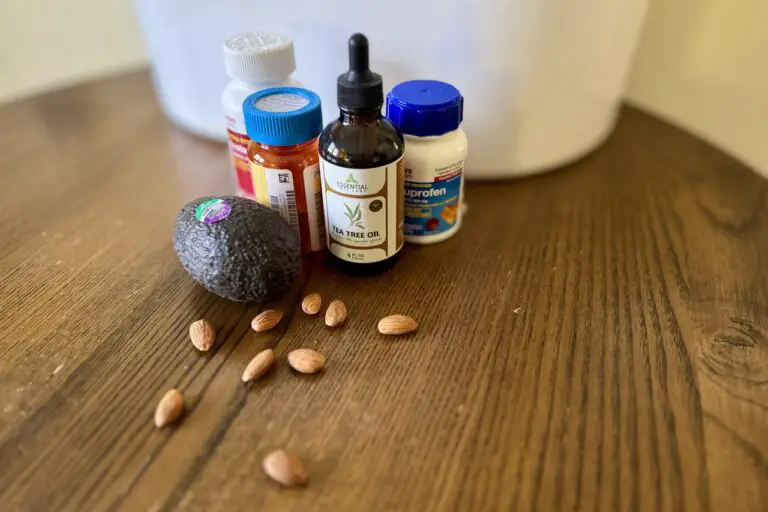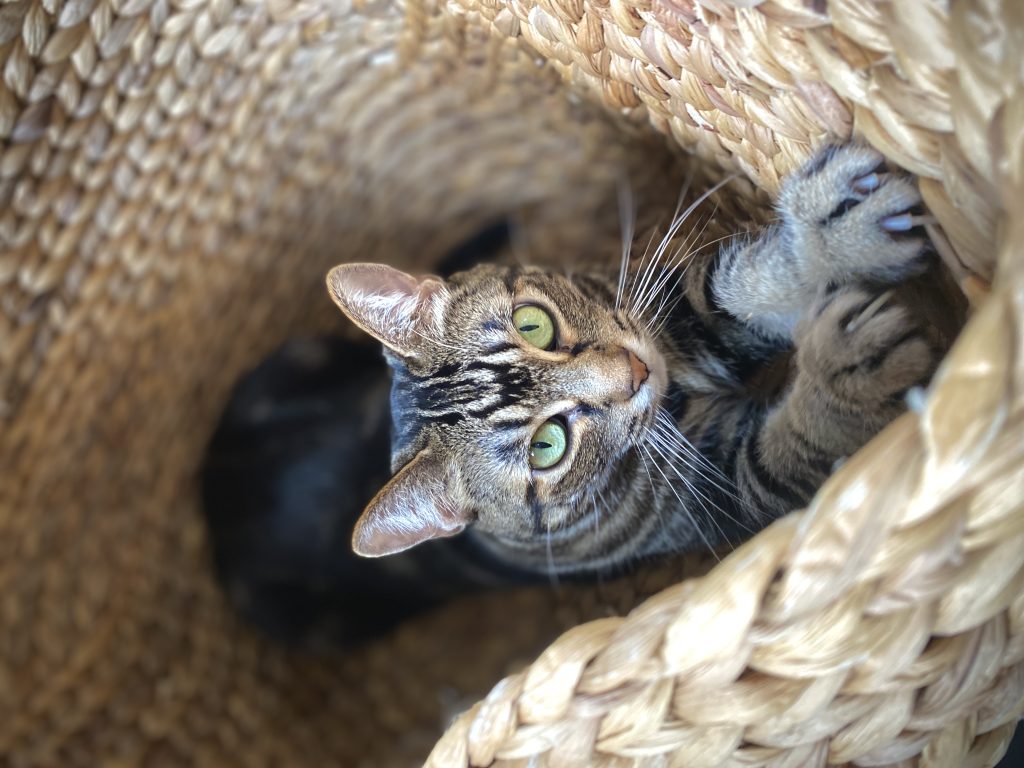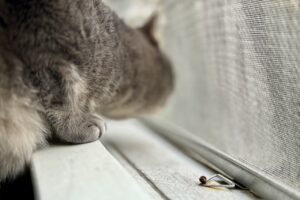Introduction to Common Household Items That are Toxic to Cats
Does your cat have access to sneaky toxic household Items?
Cats are vulnerable to accidental poisoning because of their curiosity, tendency to explore by chewing or mouthing, and frequent self-grooming (licking their own and other pets’ fur).
This is scary because our homes are brimming with things that are toxic to cats. And many of them are everyday items that may seem totally benign to us.
Disclaimer: This article is not intended to be veterinary advice. If your pet has ingested a toxin, call your vet immediately.
A few examples include certain plants, common medications, household cleaners, essential oils, and human foods.
I went years not knowing about some of this stuff.
Unfortunately, the list of hazards is not short, and it can be overwhelming to try to be on top of it all.
But there can be grave consequences when a cat becomes poisoned, including severe harm and even death in a small window of time. Therefore, safeguarding toxins is a non-optional piece of your overall cat-proofing strategy.
Address Concerns and Exposures Right Away
When in doubt, consult your veterinarian. Another good resource is the Pet Poison Helpline which allows you to search specifically [https://www.petpoisonhelpline.com/poisons/] for a substance your cat has ingested, and emergency instructions [https://www.petpoisonhelpline.com/pet-owners/emergency/ ] if your pet has been poisoned.
The Pet Poison Helpline also has a 24/7 hotline you can call: Animal Poison Control Center at 855-764-7661

This article provides a list of the most common household items that are toxic to cats, but it is not exhaustive. The level of toxicity, and the time it takes to affect a cat, varies by item and by individual animal.
So what is poisonous to cats?
Non-Exhaustive List of Common Household Items Toxic to Cats by Category
Human Medications:
- Non-steroidal anti-inflammatory drugs (NSAIDs) like ibuprofen or naproxen
- Acetaminophen (Tylenol)
- Antidepressants
- ADHD medications
- Cardiac medications (e.g., beta-blockers, calcium channel blockers)
- Cold and flu medications (many contain acetaminophen, pseudoephedrine, or phenylephrine)
- Diet pills
- Vitamins and supplements, especially those containing iron
Plants:
- All lilies
- Azaleas and rhododendrons
- Poinsettia
- Tulips and daffodils (especially the bulbs)
- Sago palm (especially the seeds)
- Dieffenbachia (dumb cane)
The list of toxic houseplants and flowers is longer, but this list includes many of the ones that can cause more significant harm.
Foods:
- Chocolate (especially dark chocolate and baking chocolate)
- Caffeine (coffee, tea, energy drinks)
- Alcohol
- Grapes and raisins
- Macadamia nuts
- Onions, garlic, and chives
- Raw eggs
- Salt and salty snack foods
- Xylitol (found in sugar-free gums, candies, and some peanut butters)
- Bitter almonds (but not sweet almonds, though more than a couple will probably cause upset stomach)
In addition to what’s listed, cats are lactose intolerant, making dairy products a no-go. I didn’t know this for the longest time and spent many years letting my cat lick my ice cream or yogurt bowl.
Household Cleaners:
- Bleach
- Ammonia
- Toilet bowl cleaners
- Carpet cleaners
- All-purpose cleaners
- Drain cleaners
- Concentrated detergents and fabric softener
Bleach, detergents, disinfectants, and products containing phenols or volatile organic compounds (VOCs) are highly toxic.
Insecticides and Pesticides:
- Flea and tick treatments not formulated for cats
- Ant baits
- Bug sprays
- Lawn and garden products containing insecticides
Many insecticides and pesticides are toxic. Especially those containing organophosphates, which are often found in flea and tick products not specifically formulated for cats.
Don’t make the mistake of assuming flea treatment for dogs is safe for your cat.
Rodenticides:
- Rat and mouse poisons (various types including anticoagulant, bromethalin, cholecalciferol)
Rat and mouse poisons can be extremely dangerous and potentially lethal. If you have a rodent problem, never use poison. A poisoned mouse is a mouse that’s easy to catch and eat. These poisons are illegal to use in some states.
Antifreeze and Automotive Products:
- Ethylene glycol-based antifreeze
- Brake fluid
- Windshield wiper fluid
Products containing ethylene glycol are lethal and have a sweet taste that can attract pets. Dogs are more vulnerable here because, unlike cats, they have a sweet tooth.
Essential Oils and Aromatherapy Products:
- Eucalyptus
- Tea tree (melaleuca)
- Cinnamon
- Citrus oils
- Peppermint
- Sweet birch
- Wintergreen
- Ylang ylang
- Pine oils
Some essential oils are toxic to cats when ingested or applied to their skin.
Fertilizers, Plant Foods, and Garden Chemicals:
- Products containing blood meal, bone meal, or fish emulsion
- Iron supplements for plants
- Pesticide-containing products
- blood meal
- bone meal
- products containing iron or pesticides
Herbicides, insecticides, fungicides, and fertilizers can be toxic to cats if ingested.
Recreational Drugs:
- Marijuana
- Tobacco and nicotine products
Personal Care Products:
- Certain shampoos and lotions
- Sunscreen
- Topical insect repellents not designed for cats
Veterinary Products and Supplements:
- Certain flea and tick medications intended for dogs but toxic to cats
- Overdoses of medications or supplements intended for cats
Some dog-specific flea and tick treatments contain permethrin, which is highly toxic to cats.
Miscellaneous:
- Glow sticks and glow jewelry
- Liquid air freshener
- Silica gel packets
- Batteries (due to heavy metals like lead and acids)
- Potpourri oils
- Liquid potpourri
- Mothballs
- Homemade play dough (contains high levels of salt)
Cat-Proofing Strategies You Can Use
When it comes to cat-proofing toxic household stuff, you’ve gotta have some systems in place. This can include:
- Use child-proof latches on cabinets that contain toxins and that your cat has access to. (Don’t underestimate your cat here)
- Store toxic items in tightly sealing storage containers.
- Make sure everyone in the house knows what’s on the above list and follows the cat-proofing systems you’ve put in place.
- Don’t keep houseplants that are highly toxic to cats.
- Never bring highly toxic plants or flowers into the house, even for a short time.
- If you have a garage, keep as many chemicals and hazards out there as possible.
- Never give your cat access to the garage.
- Keep your cat strictly indoors in order to limit hazards.
- Catify your home (provide vertical spaces, window access, prey play, and training) to reduce boredom and attention-seeking behaviors that can get a cat into trouble.
- Don’t leave toxic foods out.
- Keep your vet’s phone number in your contacts.
Final Thoughts
Again, the list provided here is not exhaustive, and the toxicity of substances can vary based on the amount ingested and the individual cat’s sensitivity.
Always keep household chemicals and potentially dangerous foods out of your cat’s reach, and use only veterinary-approved flea and tick treatments for your cat.
If you suspect your cat has ingested a toxic substance, contact your veterinarian or the Pet Poison Helpline immediately. Best to err on the side of caution.

